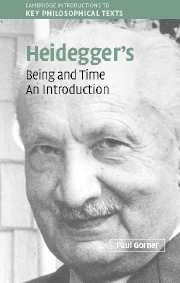1 - Introduction
Published online by Cambridge University Press: 05 June 2012
Summary
BIOGRAPHICAL NOTE
Martin Heidegger was born on 26 September 1889 in Messkirch, a small town in south-west Germany, about 20 miles north of Lake Constance. From 1903 to 1906 he attended the Gymnasium in Konstanz, having secured a scholarship through Conrad Gröber, the Archbishop of Freiburg, who was also from Messkirch. Although he attended classes at the Gymnasium he lived in a hostel reserved for boys destined for the priesthood. In 1906 he transferred to the Gymnasium and seminary in Freiburg and in 1909 briefly entered the novitiate of the Society of Jesus (the Jesuits). However he left after only two weeks, ostensibly on health grounds. Still with the intention of becoming a priest he enrolled in the theology faculty at the University of Freiburg. Although theology was his main subject he was also required to do some philosophy, though in a form approved by the ecclesiastical authorities. However he had already developed an interest in philosophy independently, specifically in the question which was to dominate his thinking throughout his career – the question of the meaning of being. The first stimulus to this came from the study of a book given to him by Conrad Gröber while he was still attending the Gymasium in Freiburg – Brentano's On the Several Senses of Being in Aristotle. And in his final year at school he came across a work by the Freiburg theologian Carl Braig On Being: A Sketch of Ontology.
- Type
- Chapter
- Information
- Heidegger's Being and TimeAn Introduction, pp. 1 - 12Publisher: Cambridge University PressPrint publication year: 2007

